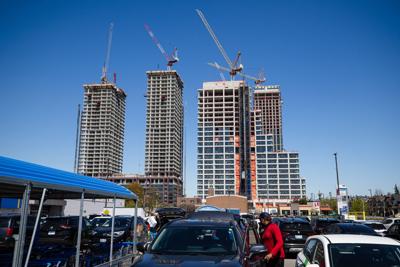The Ford government’s latest bid to jump-start housing construction appears to threaten Toronto’s 15-year-old “green standard,” which limits the greenhouse gas emissions new buildings can emit and ensures those homes are resilient to flash flooding and other consequences of climate change.
Multi-pronged legislation announced Monday by Rob Flack, the minister of municipal affairs and housing, would prevent municipalities from adding any construction requirements that differ from the provincial building code, or ordering further studies in relation to new developments.
Barring any exceptions or changes, that would gut for energy efficiency and environmental design — the outcome sought by a lobby group for homebuilders in a court action launched against the city late last year.
Killing the green standard would also likely doom Toronto’s plan to become carbon-neutral by 2040 because many of the actions, for which the city is already behind schedule, focus on buildings which produce more than half of the city’s greenhouse gas emissions.
The Residential Construction Council of Ontario, which , has argued the city doesn't have jurisdiction to exceed Ontario's building code with extra requirements including emission maximums and wiring to service electric vehicles in low- and high-rise buildings.
In a statement, RESCON president Richard Lyall said Flack’s announcement “aligns with many of the priorities identified by RESCON over the past two years,” but did not mention the green standard. Council staff said Lyall was unavailable for comment and did not answer written questions, including whether RESCON will continue the legal challenge.
City of pc28¹ÙÍøstaff and Mayor Olivia Chow’s office said Monday they could not comment until after closely studying the proposed law.
Losing the green standard would be a disaster for the environment and for Torontonians who buy homes, said Sarah Buchanan, campaigns director at the pc28¹ÙÍøEnvironmental Alliance.
“It would weaken stormwater standards for building which make us safe from flooding, stop requiring that buildings can handle EVs, end rules to make sure condos have a place to separate recycling … and without it there’s really no way that pc28¹ÙÍøcan fight climate change — more than half of emissions come from buildings,” Buchanan said.
People buying new homes wouldn’t be told they are made to lower standards and over the years would pay more for heating and cooling and potentially flood damage, she said, adding that axing Toronto’s more stringent rules would “make more money for developers but stick homeowners with the bill.”
Toronto’s “green standard” was introduced in 2006 as voluntary, environmentally friendly building guidelines. Mandatory requirements were added in four updates between 2010 and 2022, along with financial incentives for builders who take extra steps, some of which eventually became compulsory.
Requirements include builders wiring all new residential parking spots, and one-quarter of new non-residential spots, for EV charging. The Ford government removed charging station provisions from the provincial building code in 2019.
The included statements of support for the proposed law from several Ontario mayors, including Burlington’s Marianne Meed Ward, who chairs an association of Ontario big city mayors.
Meed Ward told the Star many initiatives in the legislation should get more housing built to alleviate the affordability crisis but that she was not briefed on the requirement that municipalities not impose requirements beyond the Ontario building code.
“What this means for Toronto, I don’t know,” she said, adding that her city has the power to only advise, not compel, developers to adopt green standards. “I guess encouraging or incentivizing environmental home construction is important to standardize — a patchwork of what is acceptable isn’t good for the climate.”

































To join the conversation set a first and last name in your user profile.
Sign in or register for free to join the Conversation